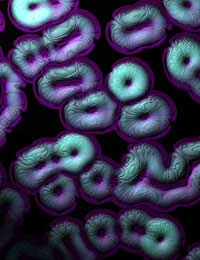What is Klinefelter's Syndrome?

Klinefelter's syndrome is a genetic variation that occurs in males. Normally, every person has 46 chromosomes. Two of these 46 are used to determine gender. Females have two X chromosomes, while males have an X and a Y chromosome. But in some cases, a variation occurs during early fetal development and the male child is born with an additional X chromosome (XXY), making a total of 47 chromosomes.
Basics Of The Condition
Although Klinefelter's syndrome is one of the more common chromosomal conditions, it's not a condition that's well known to the general public. In many cases, there may be no obvious physical or psychological effects whatsoever. For this reason, it's entirely possible that many affected males can live their entire lives without discovering that they have an extra chromosome.However, Klinefelter's syndrome is not totally without complications. Possible complications include cardiovascular disease and osteoporosis. Males with this abnormality often see increased incidence of mitral valve prolapse. They also face a higher risk of cardiovascular disease because of increased cholesterol levels. Some studies have linked Klinefelter's syndrome with diabetes and thyroid problems.
Klinefelter's Syndrome In Men
Exactly how does Klinefelter's syndrome manifest itself in males? Boys with Klinefelter's syndrome tend to be tall with long legs. Intellect is not normally affected, but there may be delays in motor skills and language development. Most XXY males will experience a delay in learning to walk. The development of verbal skills often lags behind nonverbal skills. The symptoms become especially apparent around the age of four. But again, it's important to keep in mind that some boys with Klinefelter's syndrome may show no delay in development at all.In most instances of Klinefelter's syndrome, sexual development proceeds normally throughout infancy and childhood. Toward adolescence, the onset of puberty in sexual development may be delayed. Testicular development is arrested. Gynecomastia (an enlargement of the breasts) may be possible in some adolescents. There is also less growth of facial, pubic and underarm hair compared to normal males.
Other Symptoms
Non-physical symptoms connected with Klinefelter's syndrome include shyness and a lowered self-confidence. The shyness and immaturity that sometimes occurs with this genetic disorder is most likely related to the delays in language development. Low levels of self-confidence could place artificial limits on physical and academic success. Although a few psychosocial problems may persist later in life, most males with this condition will lead entirely normal adult lives.Klinefelter's syndrome affects about one in 600 to 800 male births. Screening for this abnormality is not normally done as a matter of course. Diagnosis of the syndrome usually occurs as a result of screening for other conditions. For example, the chromosomal variation is most often diagnosed before birth during screening for Down's syndrome.
Although there is no real "cure" for Klinefelter's syndrome, it is possible to lessen the severity of symptoms through hormone therapy. Some boys with this condition (but not all) have low testosterone levels. By increasing testosterone levels through the use of injections, skin patches or gels, the physical manifestations of the condition can be altered.
Testosterone increases body hair and muscle development, shrinks or even prevents the development of enlarged breasts, and may prevent the onset of osteoporosis. Improved physical characteristics often lead to an improvement in psychosocial symptoms as well. Increasing self-confidence and self-esteem reduces negative peer relationships. Delays in language and educational development can be improved with individualised educational support and counselling.








